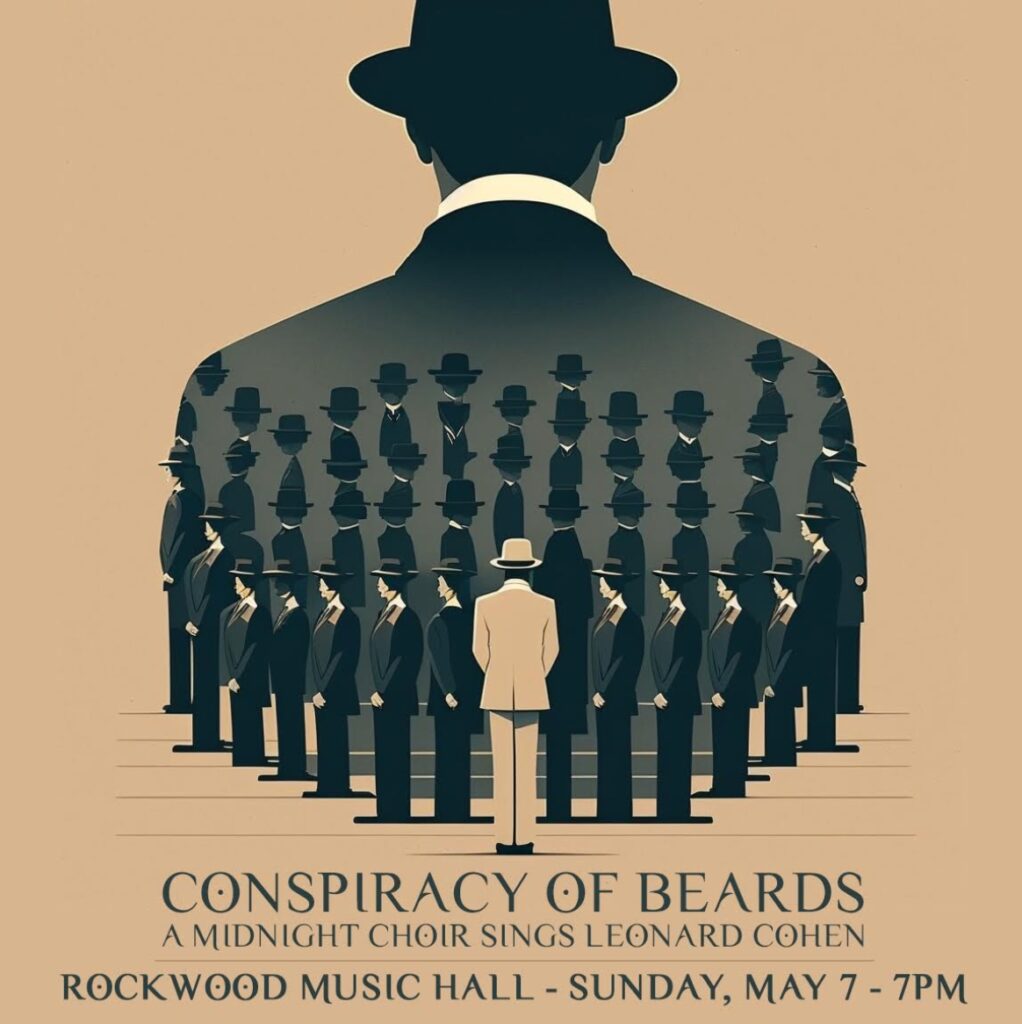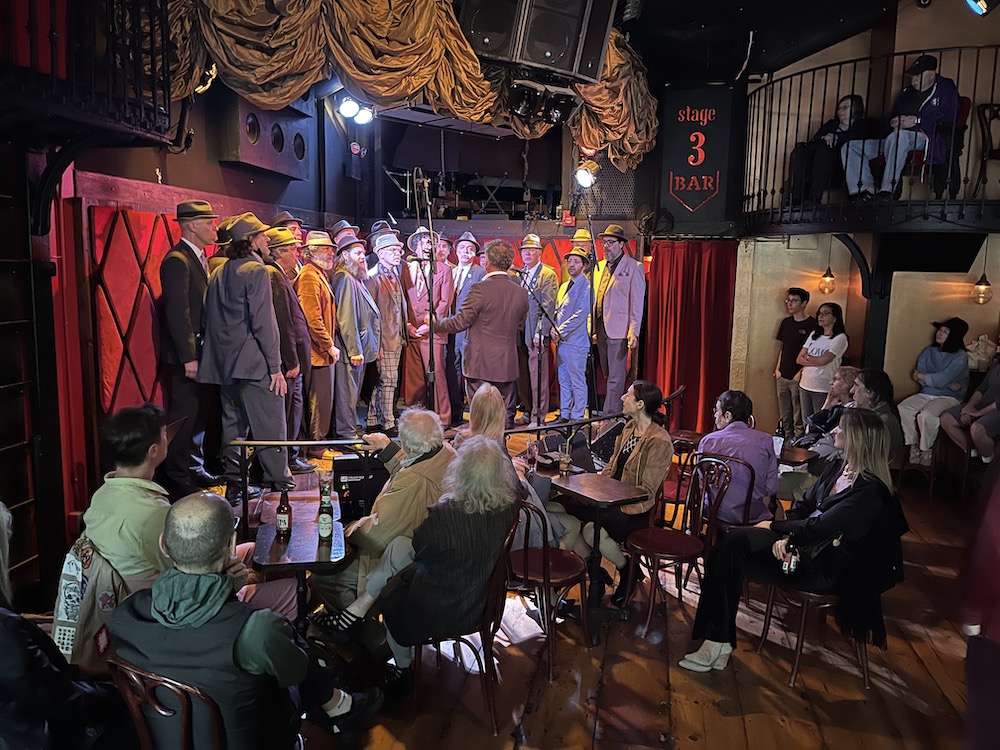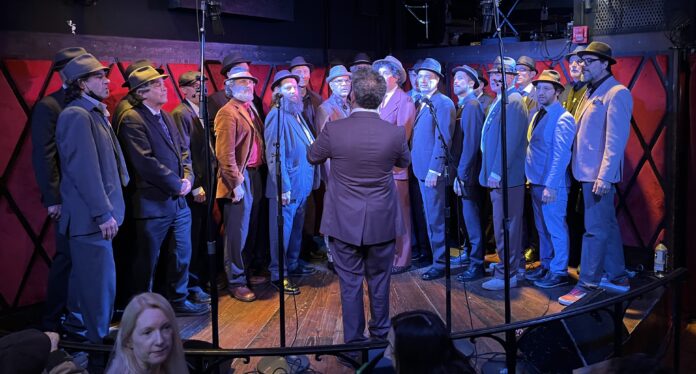It was a wondrously New York moment in May, and a dozen or so of us finely dressed men festooned with an array of hats—fedoras, pork pies, derbies, and trilbies—began tuning our voices in the tree-draped median walkway along Allen Street in the Lower East Side. Soon we were filling the cacophonous, hazy Manhattan air with the songs of Leonard Cohen. It was about 5:30pm on a still-sunny late afternoon, right across from our performance venue, the Rockwood Music Hall.
As we loosened our frames and limbered our mouths, glottal strokes, and diaphragms toward singing shape, a local filmmaker named Skivy aka Skivon Hardy happened on the scene and, with our nodding assent, began filming our vocalizations. A few young tourists pulled up to listen in as we sought out melodies and harmonies.
Singing in public space and finding our voices together—each of us honing our pitch, holding our key in harmony, aspiring to blend in unison—is part of what makes singing in the Conspiracy of Beards, a roughly 30-member a capella group that sings exclusively Leonard Cohen songs, a profoundly soulful experience.

Two days earlier we had kicked off our NYC tour—the choir’s first since the start of the Covid-19 pandemic—with choral warmups in Prospect Park, Brooklyn, surrounded by lushly verdant maple and oak trees, with cherry and magnolia blossoms shining like pearls in the cooling, silvery East Coast dusk. Suited up for song, we assembled in a finely restored wood-paneled tunnel under the Endale Arch, a 150-year-old stone masterwork designed by architects Frederick Law Olmsted and Calvert Vaux, who also conspired to design Central Park. Standing in this upside-down boat (it felt a bit like a fabled ark), we sent our rehearsal tunes rising and reverberating to passersby. “And she feeds you tea and oranges … that come all the way from China,” as goes Cohen’s eternal classic “Suzanne.”
All in all, we hit four stages in the Big Apple, including two well-traveled Brooklyn bars (Commonwealth and Barbes) and two Manhattan venues, the Chelsea and Rockwood music halls. Shepherded by the Beards’ long-time choirmaster, Daryl Henline, about 18 of us harmonized Cohen classics like “Hallelujah,” “Anthem,” “Everybody Knows,” and “So Long Marianne,” along with less famed incantations such as “Tonight Will Be Fine” and “Is This What You Wanted?”
“Talking so brave and so sweet…”
Around midnight on the streets of Manhattan, after our set at the Chelsea Music Hall, the infamous Chelsea Hotel beckoned with its vertical blood-red neon sign. Naturally, our group of Leonard Cohen crooners heeded its enticement. It proved to be far from the gritty-yet-star-studded flophouse that Cohen chronicled, and to which he dedicated lines such as, “talking so brave and so sweet; giving me head on the unmade bed, while the limousines wait in the street” (referencing his one-night tryst with Janis Joplin.) The storied venue is now chic-antique with gilded lamps and marble tables, proffering drinks with prices that can exceed three digits a glass.
Cohen’s lyrics even seemed to help explain this transformation from the wilder, grungier Chelsea Hotel of the 1960s to today’s more coiffed version: “Those were the reasons and that was New York/We were running for the money and the flesh/And that was called love, for the workers in song/Probably still is for those of them left.”
As if by the songwriter’s ghostly divination, there was even a young server at the Chelsea Hotel bar named Jane, like she of “Famous Blue Raincoat” fame. As it happened, this Jane was a genuine Cohen fan, and she danced and sang with a few of us out on the sidewalk at around 1am before skipping off home, though without “a lock of your hair,” as the song goes. A few of us Beards stumbled off toward the Brooklyn-bound subways, requisite slab of greasy pizza in hand.
Cohen’s songs are richly intriguing, often mind-twisting adventures filled with mythic stories, piercing earnestness, and multiple veiled meanings. Looking for those hidden and many-layered meanings is part of the brain-enhancing, heart-opening journey of his work. As one writer described, Cohen, “divulged hard truths with the sort of careworn beauty that triumphantly makes sense of human tragedy while offering up solace as it does so.”

“I heard there was a secret chord…”
For those uninitiated, the Conspiracy of Beards may not sound exactly like Cohen (we’d have to all be gravelly basses to approach his later years, in particular.) Instead, the elaborate choral arrangements, crafted by several Beards members over the years, are layered to unfold a tapestry of bass, baritone, and tenor parts that alternatingly interweave and blend in waves of vigor and tenderness.
The choir’s singularly odd name is a pun. The “conspiracy” is a group of people breathing together (con-spiring) as artists and activists. The beards, only sported by some of the members, “serve as a metaphor for principled creative nonconformity, from an era before facial hair became standard,” choir President Bobby Coleman elucidates.
Born in 2003, the Beards were created as a tribute to the vision of Bay Area multimedia artist Peter Kadyk, who died in 2001. As the choir’s website describes, “Originally conceived as a one-time performance, comprised of 8 or 9 guys singing just 2 or 3 songs, the choir immediately gained a momentum and continued well past everyone’s expectations.”
A 2016 review of the Beards’ tour in Los Angeles called the choir, “unlike any cover band you have ever experienced” and “nothing short of a heavenly experience.” To further honor and celebrate Cohen’s work, the Beards launched the annual Leonard Cohen Festival, held in November, which features musicians such as Graham Patzner and Friends, Classical Revolution, Melinda Martinez Becker, and Cello Joe. The troupe has performed at the Hardly Strictly Bluegrass Festival, and even toured Europe and appeared on Czechoslovakian television.
“It’s really about the joy of singing,” longtime Beards singer and choir director Daryl Henline described back in 2004. “Outside of academic settings or the church, people don’t really get to experience choral singing, which is a shame, because it’s beautiful. There’s a lot of love, a lot of soul, in what we do. God, the harmonized voices just create such a field of energy, with the sympathetic resonation.”
“Come healing…”
Seeking more joy and companionship in song, I joined the Beards in the dubious, grim moment of the fall of 2021, as the Covid-19 pandemic raged on. I’d been wanting to sing in a group for years, but perhaps it took the seemingly unending cloistering of the pandemic to push me onto the musical diving board. It was an unlikely time to congregate with other people in a room, inhaling and exhaling together. We tested before each practice, sometimes wearing masks, and staying far apart with the windows open and air filter churning. At times, some would “Zoom” into practice from home, though it was a paltry facsimile for which we’d mute ourselves, barely able to hear the voice of our fellow singers.
Many of us got Covid, and huddling close together in vigorous song may well have been a cause. But we muddled and soldiered on, like everyone else, and performed when possible, including at a benefit to aid artist Paul Madonna after a car accident and, more recently, an exuberant memorial celebrating the life of artist Danny Starling. As restrictions gradually eased, we found ways to perform again, and that sign of our own healing and persistence seemed to mirror and support that of others.
Lifting ourselves up together in song is not only joyous, it’s powerfully healing. There’s something uniquely powerful about a group of men finding song together—listening, hearing, blending, and bonding. It’s certainly about the singing and the joy of performing, though it’s also an act of faith and love. Leonard Cohen’s songs invite and enable us to come together as men, non-aggressively pursuing harmonies and blending in a time of discord and disarray. It feels like we are singing to bring ourselves together—to, in Cohen’s words, “Come healing of the body, come healing of the mind.”
More information on Conspiracy of Beards here, here, and here.






